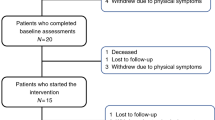Abstract
Use of alternative therapy for breast cancer outside of the hospital setting has been identified as a marker of psychological distress. Whether acquiescence to experimental therapies within the medical setting might also be a sign of psychological distress is not well known. We therefore evaluated patients with breast cancer undergoing bone marrow transplantation (BMT), an experimental method for treatment, to determine if acquiescence to further adjunctive experimental therapy related to psychological distress. In order to do this, we studied psychological test results of 42 breast cancer patients undergoing BMT at the University of Florida between January and December 1997. These tests included the Medical Outcomes Short Form Health Survey, the Beck Depression Inventory, the State-Trait Anxiety Inventory and the Medical Coping Modes Questionnaire. Women who accepted adjunctive experimental therapy had significantly higher trait anxiety and poorer role functioning compared to women who did not (both P < 0.001). these findings suggest that psychological distress may be a factor in medical decision-making even within the medical setting and that prospective research in this area is warranted. Bone Marrow Transplantation (2000) 25 , 673–676.
This is a preview of subscription content, access via your institution
Access options
Subscribe to this journal
Receive 12 print issues and online access
$259.00 per year
only $21.58 per issue
Buy this article
- Purchase on Springer Link
- Instant access to full article PDF
Prices may be subject to local taxes which are calculated during checkout
Similar content being viewed by others
References
Burstein HJ, Elber S, Guadagnoli E et al. Use of alternative medicine by women with early-stage breast cancer New Engl J Med 1999 340: 1733–1739
Eisenberg DM, Davis RB, Ettner SL et al. Trends in alternative medicine use in the United States 1990–1997: results of a follow up national survey JAMA 1998 280: 1569–1575
Friedman T, Slayton WB, Allen LS et al. Use of alternative therapies for children with cancer Pediatrics 1997 100: E1
Crocetti E, Crotti N, Feltrin A et al. The use of complementary therapies by breast cancer patients attending conventional treatment Eur J Cancer 1998 34: 324–328
Gotay CC, Hara W, Issell BF et al. Use of complementary and alternative medicine in Hawaii cancer patients Hawaii Med J 1999 58: 94–98
Grootenhuis MA, Last F, deGraaf-Nijkerk JH et al. Use of alternative treatment in pediatric oncology Cancer Nurs 1998 21: 282–288
Holland JC . Use of alternative medicine – a marker for distress? New Engl J Med 1999 340: 1758–1759
Ware JE . SF-36 Health Survey Manual and Interpretation Guide Nimrod Press: Boston 1993
Sears SF, Rodrigue JR, Greene AF et al. Predicting quality of life with a pretransplantation assessment battery: a prospective study of cardiac recipients J Clin Psych Med Set 1995 2: (Suppl. 4) 335–355
Beck AT, Steer RA, Garbin MG . Psychometric properties of the Beck Depression Inventory: twenty-five years of evaluation Clin Psych Rev 1988 8: 77–100
Spielberger CD . Manual for the State-Trait Anxiety Inventory Consulting Psychologists Press: Palo Alto 1983
Holland HK, Dix SP, Geller RB et al. Minimal toxicity and mortality in high risk breast cancer patients receiving high dose cyclophosphamide, thiotepa, and carboplatin plus autologous marrow/stem-cell transplantation and comprehensive supportive care J Clin Oncol 1996 14: 1156–1164
Antman KH, Rowlings PA, Vaughan WP et al. High dose chemotherapy with autologous hematopoietic stem cell support for breast cancer in North America J Clin Oncol 1997 15: 1870–1879
Peters WP, Ross M, Vredenburgh JJ et al. High dose chemotherapy and autologous bone marrow support as consolidation after standard-dose adjuvant therapy for high-risk primarybreast cancer J Clin Oncol 1993 11: 1132–1143
Blais R, Maiga A, Aboubacar A . How different are users and non-users of alternative medicine? Can J Public Health 1997 88: 159–162
Schar A, Messerli-Rohrback V, Schubarth P . Conventional use of complementary medicine: what criteria for choosing do patients use? Schweiz Med Wochenscr Suppl 1994 62: 18–27
Montbriand MJ . Alternative therapies as control behaviours used by cancer patients J Adv Nurs 1995 22: 646–654
Risberg T, Bremnes RM, Wist E et al. Communicating with and treating cancer patients: how does the use of non-proven therapies and patients’ feeling of mental distress influence the interaction between the patient and the hospital staff Eur J Cancer 1997 33: 883–890
Sato T, Takeichi M, Shirahama M et al. Doctor-shopping patients and users of alternative medicine among Japanese primary care patients Gen Hosp Psych 1995 17: 115–125
Sollner W, Zingg-Schir M, Rumpold G et al. Attitude towards alternative therapy, compliance with standard treatment and need for emotional support in patients with melanoma Arch Dermatol 1997 133: 316–332
Johnson M, Webb C . The power of social judgement: struggle and negotiation in the nursing process Nurse Educ Today 1995 16: 83–89
Verhoef MJ, Hagen N, Pelletier G et al. Alternative therapy use in neurological disease: use in brain tumor patients Neurology 1999 52: 617–622
Author information
Authors and Affiliations
Rights and permissions
About this article
Cite this article
Mehta, P., Rodrigue, J., Nejame, C. et al. Acquiescence to adjunctive experimental therapies may relate to psychological distress: pilot data from a bone marrow transplant center. Bone Marrow Transplant 25, 673–676 (2000). https://doi.org/10.1038/sj.bmt.1702210
Received:
Accepted:
Published:
Issue Date:
DOI: https://doi.org/10.1038/sj.bmt.1702210
Keywords
This article is cited by
-
Gender, age and surgery as a treatment modality leads to higher distress in patients with cancer
Supportive Care in Cancer (2011)
-
Complementary and alternative medicine use is associated with an increased perception of breast cancer risk and death
Breast Cancer Research and Treatment (2005)



